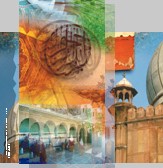|
Chickens,
Eggs Section |
|
||||
| Mindanao is Bleeding Statements of Peace Unleashing the Dogs of War The Abuja Islamic Education Trust Poetry Essays Featured Links Growth Mindanao Manila Moods Online Virtual Bugs Innovative Ideas Design Archives The book BUGS & BYTES, In Bigger Prints, is now available at National Book Store outlets in MetroManila and the UP Press Bookshop in UP Diliman, Quezon City. Support B&B by searching and buying your books & CDs from here. |
Understanding The 'Relations' Between Christians and Muslims by Fr. Eliseo R. Mercado, Jr., OMI [The author is President of the Notre Dame University in Cotabato City.] IN THE NEW MILLENNIUM, the suspicion and fears that exist between the Christians and the Muslims still linger. In fact, there are places and cultures where, because of some "extremist" groups, the suspicion and fears have actually become antagonism and hostility. The depressing fact, nay tragedy, is that, despite globalization and the rapid advances of technology and mass communications, the misunderstanding between Christians and Muslims continues. Yes, distrust, fear and even hostility continue to persist. The many and varying peace processes as well as "democratization" in many hot spots are very remarkable and encouraging events. The Peace Processes in the Middle East are prospering albeit very slowly. The "return" to democracy of Indonesia considered the "largest Islamic" country is positive development in a new and growing perception about Islam. The Final Peace Accord between the Philippine Government and the Moro National Liberation Front is another story of successful negotiated peace settlement. The victory of President Khatami in Iran is also seen as the victory of moderate Islam versus its extremist and ugly face. The return to sanity and normalcy in East Timor after so much atrocities is another story of a new birth. The suspicion and fear, even hostility, are deeply rooted in history. People claim that the "rootedness" of misunderstanding is also to be found in the very "psyche" of the two cultures and two worlds. The history is marred by conflict. The history of relationship between Christianity and Islam has given rise to an enduring tradition of fear, distrust and hostility, because the two worlds have so often charted collision and contradictory ways/courses. The history of crusades, the Spanish re-conquista, the fall of Constantinople, the Ottoman expansion to Europe in 1529 and 1683, the Napoleon’s conquest of Egypt in 1798, the West colonial expansion embracing almost all the world of Islam and the fall of the Ottoman Empire are few examples of the historical "rootedness" of the fears, distrust and hostilities. The legacies of the past are still alive. They remind the living of the bitter encounters between Christianity and Islam. They continue to enslave the present day consciousness that prevents both Christians and the Muslims from embarking into new relationships of trust and friendship. FOR ALL THE FEARS, distrust and hostilities between the two worlds, there are interesting, nay wonderful convergences or "kindredness between Christianity and Islam. First and foremost, Christians, Muslims and Jews are all "Peoples of the Book." Yes, Christianity and Islam share a common monotheistic vision. In the language of Vatican II: "They worship God, who is one, living and subsistent, merciful and almighty, the Creator of heaven and earth, who has also spoken to people" (Vat. II, NA, No. 3). In fact, the same Council recognizes the quarrels and dissensions between Christians and Muslims over the centuries and (it) "now pleads with all to forget the past, and urges that a sincere effort be made to achieve mutual understanding; for the benefit of all, let them together preserve and promote peace, liberty, social justice and moral values" (ibid.). Moreover, Christians and Muslims share many key values in common: respect for knowledge, for justice, compassion towards the poor and underprivileged, the importance of family life, respect for parents and elders and consultations/consensus in the determination of societal/community affairs. These days, there is a growing myopia not only in our common attitude toward each other, but also in the way we understand the roles of religions and the religious in society. It is a tragedy that the extreme and the superficial versions of Christianity and Islam have temporarily hijacked our attitudes and understanding. Many Christians view Islam in terms of the tragic wars in the Balkans, the former Yugoslavia, Kosovo, and the extreme developments in Afghanistan, Iran and Pakistan. No doubt, the extremes exist on both Islam and Christianity, and they must be dealt with. But when used as a basis to judge a people and society, they lead to distortion and unfairness. OFTENTIMES, OUR JUDGEMENT of each other has been grossly distorted by taking the extremes to be the norm. This is a serious mistake! It is like judging the quality of life in a community by the existence of murder, rape, drug addiction, etc. We have to school ourselves to see things that the extremes are rarely practised and the extremists are, indeed, very little minority. By highlighting the extremes, we are actually engaged in peddling those unthinking prejudices. The truth is, of course, different and always more complex. Moreover, in the cases of the world of Islam, there is the urgent need to distinguish the religion of Islam from the practices of some Islamic States. We do not judge Islam by the practices of the Taliban in Afghanistan and the "fundamentalists" in many countries today. We must not succumb to the temptation to believe that extremism is in some way the hallmark and essence of Islam and/or Muslims. In the first place, extremism is not the monopoly of Islam. Religions and ideologies including Christianity have their share of extremism. The good news is the fact that the vast majority of Christians and Muslims are moderates in their politics. Theirs is the religion of the "middle way" or moderation. Thus, if we are to understand each other, we must learn to distinguish clearly between the vast majority of believers who are moderates and the terrible violence of a small minority who are known as "Extremists." The challenge to us today is to learn to understand each other, and to educate our children – a new generation, whose attitudes and cultural outlook may be different from ours – so that they understand too. We have to show trust, mutual respect, and tolerance, if we are to find the common ground between us and work together to find solutions to the many and varied issues that divide us. We can no longer afford to stand apart from a common effort to solve our common problems of "unpeace" and lack/little development. UNDERSTANDING AND MOVEMENT toward peace has to be two-way. Each of us needs to understand the importance of peace, reconciliation, development, and of reflection. There is the necessity to open our minds and unlock our hearts to each other. The Arabic word for this is "TADABBAR"! St. Francis of Assisi in his famous prayer invites us to: Where
there is hatred, let me bring love; Yes, there are failing of understanding and tolerance right on our own doorstep. In the coming months and as we begin the New Millennium, we hope that we shall learn to demonstrate that we are not bigots and extremists ourselves! We continue to build bridges of understanding in the spirit of genuine tolerance. Christians and Muslims must spare no effort to live and work each other, and with others, towards reconciling conflicts and helping grassroots level communities to act upon their own choices in self-development towards a more just, participatory society. There are no simple answers to the question of living together as Christians and Muslims. Every situation ought to be handled after seriously considering the factors at play. Some of them are historical, social or doctrinal. Whatever the factors and their magnitude, it is our duty to see a better society where people of different faiths and cultures live in love, justice and peace. We have the obligation to emphasize that which unites us and make an effort to set aside that which would divide us. We can only do this if we have full understanding of what the other believes, and are committed to the principle of respect and recognition of the beliefs and feelings of every community and person. We cannot conclude this reflection without showing our admiration and applause to those men and women of goodwill, Muslims and Christians, who work tirelessly to promote good and friendly relations between Christians and Muslims. We have much to offer each other. We have much to do together. We have much work ahead of us. We shall need to work harder to understand each other, to drain out poison between us, and to lay the ghost of suspicion and fear. The further down that road we can travel the better the world that we shall create for our children and for future generations. /ermomi/the western world/
|
||||
| . | Copyright © 1999 - 2000 |
||||


